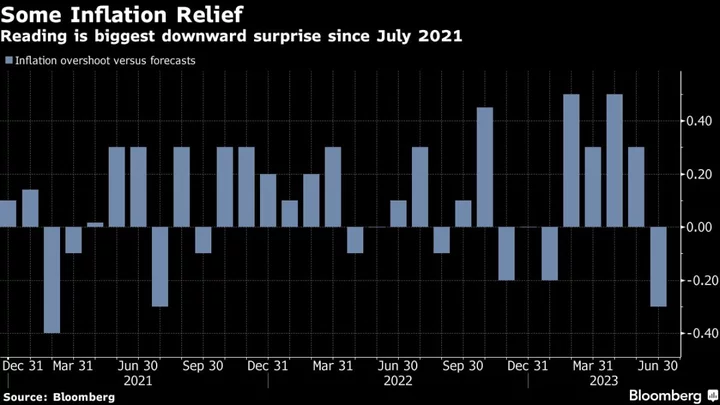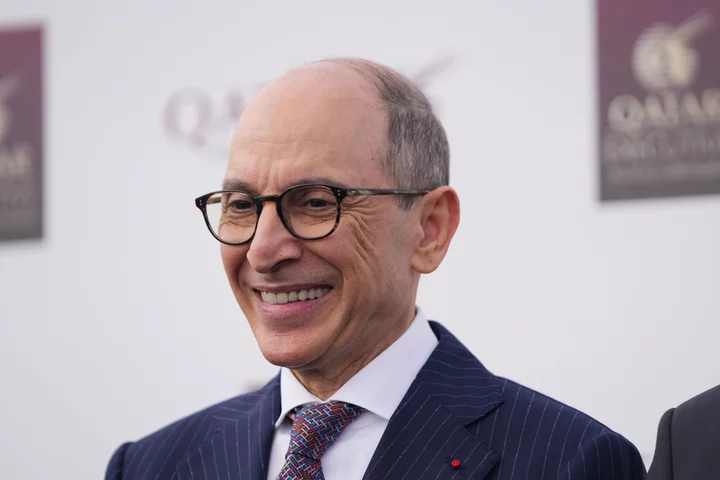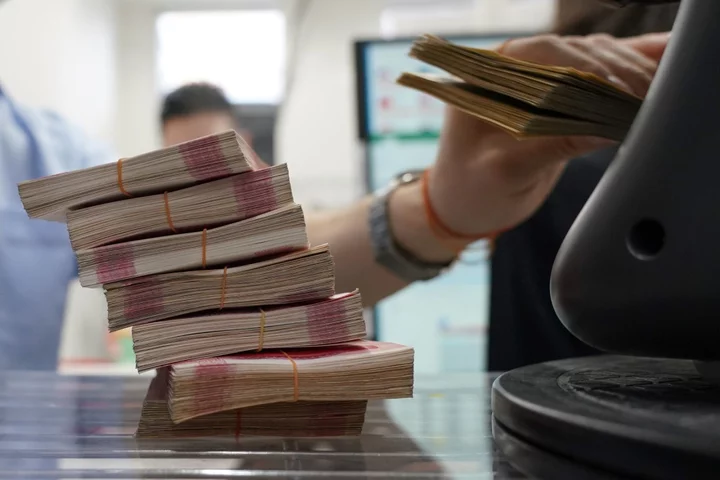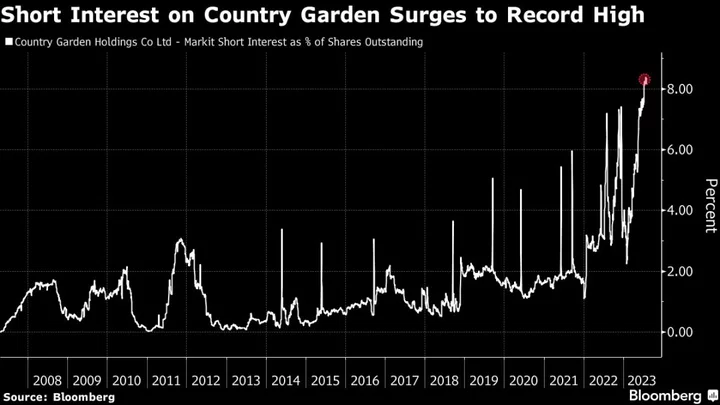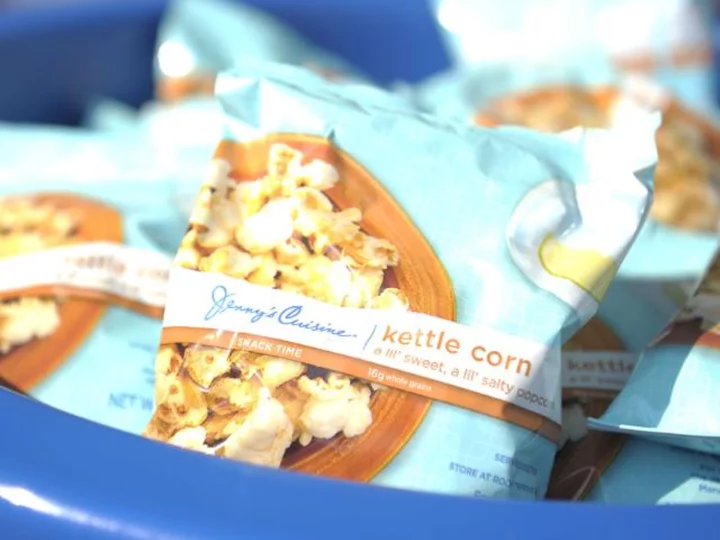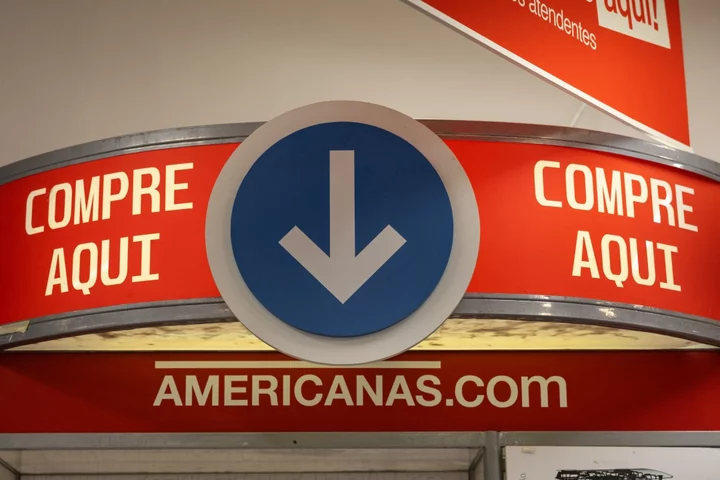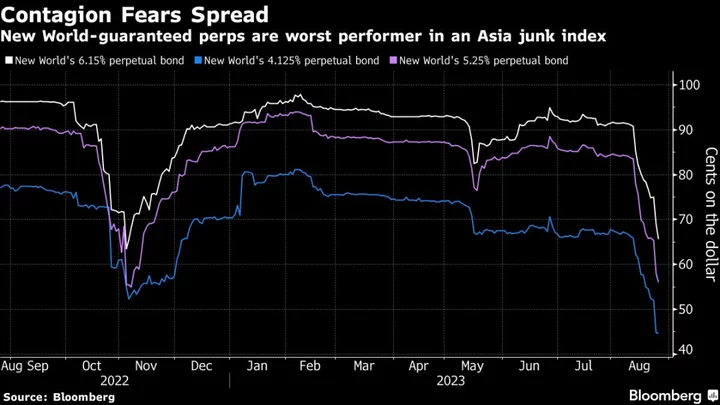Britain’s inflation rate cooled more than expected to the lowest level in more than a year, a sign that soaring interest rates may be starting to curtail the worst wage-price spiral in the Group of Seven nations.
The Consumer Prices Index was 7.9% higher than a year ago in June, a sharp drop from the 8.7% reading in May, the Office for National Statistics said Wednesday. The pound weakened, and investors pared back bets on a further sharp surge in interest rates.
It was the first downward surprise in five months and the biggest miss since July 2021, below the 8.2% expected by economists.
“The main story today is that inflation is lower than expected, fueling a narrative that we are through the worst,” said Kitty Ussher, an economist at the Institute of Directors. “The Bank of England will hope that this will cause business leaders and others to lower their expectations of future inflation, which could then become self-fulfilling.”
Core inflation also fell to 6.9% from 7.1%, suggesting the quickest series of interest rate increases in three decades may be starting to rein in soaring prices. That revived speculation about how many more rate hikes the Bank of England will deliver to contain prices, which are still rising almost four times quicker than its 2% target.
“You could almost hear the sigh of relief at the BOE,” said Valentin Marinov, head of G-10 currency research at Credit Agricole. “As a minimum, the UK rates investors could reconsider their expectations of a 50bps hike in August and may even reassess the expectation of 6% terminal rate.”
What Bloomberg Economics Says ...
“The unexpected slowdown in core inflation in June will probably be enough for the Bank of England to favor a 25 basis-point hike at its August meeting — but the decision is likely to be finely balanced. With underlying price pressure set to ease only slowly over the remainder of the year, we think the central bank is on course to hike rates again in September and November.”
—Dan Hanson and Ana Andrade, Bloomberg Economics. Click for the REACT.
Investors cut bets on further Bank of England interest-rate hikes, driving down the pound. It slid as much as 0.8% to a one-week low of $1.2931.
The market now sees the key rate peaking below 6%, down from as high as 6.5% priced earlier this month. The odds of a half-point hike in August — almost fully priced before the release — dropped to one in two. Gilts soared, sending the yield on the two-year note more than 20 basis points lower to 4.86%, putting it on course for its biggest drop since March.
“After the disappointment of more persistent than expected inflation in May, June’s reduction in headline inflation is a relief for consumers and industry alike,” said Lisa Hooker, industry leader for consumer markets at PwC.
The sharp easing means inflation is now in line with the BOE’s expectations for where price growth would be in June. Inflation in recent months had been running well above what the BOE had predicted in its May forecasts, helping to boost bets on higher interest rates.
Services inflation — a measure being closely watched by the Bank of England for signs of domestically generated inflation — also eased to 7.2% in June, down from 7.4% the previous month. Services prices rose just 0.5% from May, less than half the average of the previous four months. Prices of non-energy industrial goods, a measure of core inflation, fell for the first time since January.
“That’s a pleasant number for the BOE,” said Rishi Mishra, an analyst at Futures First Canada. “At 6.9%, core CPI is still very high, but the direction of travel is right and I think the market will shift the terminal rate closer toward 5.75%.”
The ONS said inflation was dragged down by falling prices for motor fuel and cooling grocery bills. Prices for food and non-alcoholic drinks climbed 17.3%, down from a 18.3% rise in May. Inflation in restaurant and hotel prices also dropped to 9.5% from 10.3% in May, driven by the accommodation sector, in a sign that demand may be loosening and wage pressures may be beginning to ease.
Yael Selfin, chief economist at KPMG, said the Bank of England was “unlikely to substantially change its hawkish policy stance” as inflation was still well above target.
“Inflation is unlikely to return to target before early 2025,” she said. “We expect inflation to average 7.5% this year before falling to 3% in 2024.”
Slowing inflation is a relief for consumers, who have been struggling with food and energy costs, as well as a spike in mortgage rates. It also helps Prime Minister Rishi Sunak ahead of key special elections on Thursday. Sunak, whose Conservative Party lags far behind the Labour opposition in national opinion polls, has promised to cut the pace of price increases in half this year from the 10.5% reading at the end of 2022.
“Inflation is falling and stands at its lowest level since last March,” Chancellor of the Exchequer Jeremy Hunt said in a statement. “But we aren’t complacent and know that high prices are still a huge worry for families and businesses.”
There were further signs of pipeline price pressures easing, which officials hope will be soon be passed on by retailers. Producer input prices fell a larger-than-forecast 1.3% on the month amid a drop in oil and commodity prices. They were down 2.7% from a year earlier, the first negative annual reading since November 2020.
The price of goods leaving factory gates fell 0.3%, leaving them up just 0.1% on the year.
--With assistance from Greg Ritchie, Philip Aldrick and Alice Gledhill.
(Updates market reaction)

